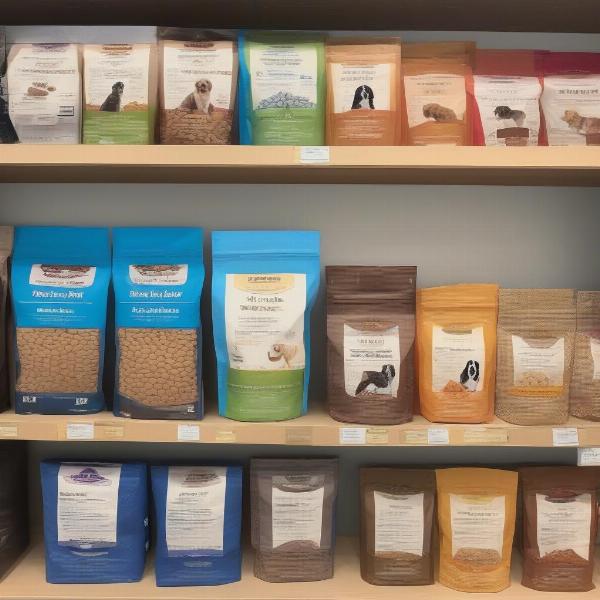Grain and potato free dog food has become increasingly popular among pet owners seeking alternative dietary options for their canine companions. Whether your dog has specific allergies, sensitivities, or you’re simply exploring healthier choices, understanding the benefits and potential drawbacks of grain and potato free diets is crucial. This guide will delve into the key aspects of grain and potato free dog food, helping you make informed decisions for your furry friend.
Why Choose Grain and Potato Free Dog Food?
Many dogs thrive on grain and potato free diets, particularly those with sensitivities to these ingredients. Common signs of grain or potato intolerance include itchy skin, digestive upset, and recurring ear infections. By eliminating these ingredients, you can potentially alleviate these symptoms and improve your dog’s overall well-being. Grain free diets can also be beneficial for dogs with certain medical conditions like diabetes or inflammatory bowel disease.
Additionally, some pet owners believe grain-free diets promote healthier skin and coat, increased energy levels, and better weight management. However, it’s essential to note that these benefits aren’t universally guaranteed and may vary depending on the individual dog and the specific food formula.
Selecting the Right Grain and Potato Free Dog Food
Choosing the appropriate grain and potato free dog food requires careful consideration of your dog’s specific needs and health status. Look for formulas that feature high-quality animal protein sources, such as chicken, fish, or beef, as the primary ingredient.
 Choosing Grain-Free Dog Food
Choosing Grain-Free Dog Food
Ensure the food also provides a balanced blend of essential nutrients, including vitamins, minerals, and healthy fats. Avoid foods with artificial colors, flavors, and preservatives.
Key Ingredients to Look For:
- High-quality animal protein: Provides essential amino acids for muscle development and overall health.
- Healthy fats: Support skin and coat health, cognitive function, and energy levels. Omega-3 and Omega-6 fatty acids are particularly beneficial.
- Fruits and vegetables: Offer essential vitamins, minerals, and antioxidants.
- Probiotics and prebiotics: Promote healthy digestion and a balanced gut microbiome.
Transitioning to a Grain and Potato Free Diet
When switching your dog to a grain and potato free diet, it’s crucial to do so gradually to avoid digestive upset. Start by mixing a small amount of the new food with their current food, gradually increasing the proportion of the new food over several days. Monitor your dog closely for any signs of digestive issues, such as vomiting or diarrhea. lifestage grain free dog food
If your dog experiences any adverse reactions, consult with your veterinarian. They can help determine if the new food is suitable for your dog or recommend alternative options.
Common Misconceptions about Grain and Potato Free Dog Food
One common misconception is that all grain and potato free dog foods are inherently healthier. This is not always the case. The quality of ingredients and the overall nutritional balance are more important than the absence of grains and potatoes. inception dog food reviews Another misconception is that grain free diets are suitable for all dogs. While many dogs benefit, some may require grains and potatoes for optimal health. Always consult your veterinarian before making any significant dietary changes for your dog. grain free salmon and sweet potato dog food
Conclusion
Grain and potato free dog food can be a beneficial dietary option for many dogs, especially those with sensitivities or specific health conditions. By carefully selecting a high-quality formula and transitioning your dog gradually, you can help them thrive on a grain and potato free diet. Remember to consult with your veterinarian to ensure the diet aligns with your dog’s individual needs and health status. annamaet dog hypoallergenic dog treats uk
FAQ
- Is grain and potato free dog food good for all dogs? Not necessarily. While many dogs thrive on grain-free diets, some may require grains for optimal health. Consult your veterinarian before making any significant dietary changes.
- What are the signs of grain or potato intolerance in dogs? Common signs include itchy skin, digestive upset, and recurring ear infections.
- How do I transition my dog to a grain and potato free diet? Gradually mix the new food with their current food over several days, increasing the proportion of the new food slowly.
- What should I look for in a high-quality grain and potato free dog food? Look for high-quality animal protein as the primary ingredient, along with a balanced blend of essential nutrients, vitamins, and minerals.
- Are grain free diets more expensive than traditional dog food? Generally, grain-free formulas tend to be slightly more expensive due to the higher quality ingredients.
- Can puppies eat grain and potato free dog food? Yes, there are grain-free formulas specifically designed for puppies.
- What are some good alternatives to grains and potatoes in dog food? Common alternatives include sweet potatoes, lentils, chickpeas, and peas.
ILM Dog is a leading international online resource dedicated to providing expert advice on dog care, breeds, health, and training. We offer a wealth of reliable and practical information to help dog owners worldwide ensure the well-being of their beloved canine companions. From breed selection and puppy care to senior dog care and travel tips, we cover all aspects of responsible dog ownership. ILM Dog is your trusted partner in providing the best possible care for your furry friend. Contact us for expert advice and personalized recommendations: Email: [email protected], Phone: +44 20-3965-8624.